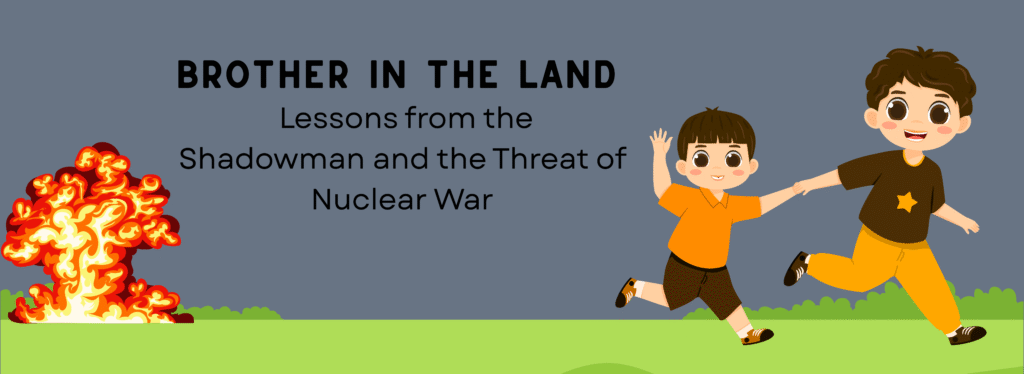Here, we have The Brother in the Land Act 1 notes

Shadowman’s Appeal
It is directed to the people who wish to destroy the world and sabotage peace. The Shadowman claims that it is very unfair to destroy and demolish the entire civilization just for the sake of your own will to keep ruling and fighting for land and power. He suggests being more positive and living a peaceful life. His message is “Live and let live.”
Mr. Richard Lying To Mrs. Troy
Mr. Richard does that so he can store the big bottles of water for his family, as the town is at war and it might go on for days. He fears that the civilians might even face water and food scarcity. He wants to store food and water for the coming days. It is rather unethical to refuse the customer, and he would not do such a selfish act on normal days, but for survival of the fittest, he has to be mean.
Precautionary Steps in Case of a Nuclear Attack in Your Area
- When you hear the four-minute warning, immediately take cover in the nearest and safest shelter — ideally a basement, underground structure, or a room without windows.
- If you are outdoors, lie flat on the ground and cover your head until the initial blast wave passes. Once it is safe, move quickly to the nearest shelter.
- If you are still outdoors and alive, remove your outer clothing carefully — it may be contaminated with radioactive particles. Place it in a sealed plastic bag and keep it away from people and pets.
- Use a clean cloth, tissue, or towel to gently wipe radioactive dust from your hair, face, and exposed skin. Do not use water if supplies are limited, and avoid scratching or rubbing.
- Once sheltered, close all doors, windows, and ventilation systems to prevent radioactive dust from entering. Seal any gaps using duct tape, plastic sheets, or damp towels.
Here, we have more precautions!
- Avoid touching your eyes, mouth, or open wounds until you have washed or cleaned your skin.
- Stay indoors for at least 24–48 hours, unless official sources announce it is safe to go out. Radiation levels drop rapidly during this time.
- Listen to official instructions through radio, television, or verified online government channels.
- Use stored food and bottled water; do not eat or drink anything that was left uncovered or outside during the blast.
- Keep calm and conserve power — turn off non-essential electrical devices and use flashlights instead of candles to avoid fires.
- If someone is injured or showing signs of radiation sickness (nausea, dizziness, or burns), cover their wounds, minimize contact, and seek medical help as soon as authorities allow movement.
Q. In the opening scenes of The Brother in the Land, the author contrasts the calm ignorance of youth with the anxious preparation of adults. How does this contrast, along with the author’s use of setting, dialogue, and tone, prepare the audience for the devastating consequences of a nuclear war?
Let’s have a closer look at this question. The Brother in the Land Act 1 notes
The opening scenes of The Brother in the Land create a powerful sense of tension and irony. While the older and wiser townspeople sense the danger of an approaching nuclear war and begin to store food, water, and supplies, the younger characters remain carefree and dismissive. This difference in attitude highlights a major theme of the play — how easily people, especially the young, underestimate the seriousness of a crisis until it’s too late.
The author skillfully uses contrast to show the gap between awareness and ignorance. The adults’ quiet fear and cautious behavior stand against the youths’ laughter, teasing, and disbelief. This makes the audience uneasy because they can sense what the young characters cannot — that disaster is coming soon.
The setting also plays a crucial role. The story begins in a peaceful town that trembles “with the fear of nuclear war.” This phrase immediately introduces tension — even though nothing has happened yet, the atmosphere is heavy with dread. The audience feels the growing sense of doom beneath the surface of ordinary life.
Through the dialogue, the author reveals the characters’ personalities and attitudes. The young people’s casual conversations and jokes contrast with the adults’ serious discussions. This difference in tone builds dramatic irony — the audience knows more than the characters do, which creates suspense and emotional engagement.
Finally, the tone of the opening scenes is one of uneasy calm — like the quiet before a storm. The author’s language and pacing make the audience anticipate that something terrible is about to happen.
Together, these techniques — contrast, setting, dialogue, and tone — prepare the audience for the worst. They make the peaceful beginning feel fragile and short-lived, setting the stage for the shocking and tragic events that follow in the play.
If you want to see more content like this, click this BUTTON